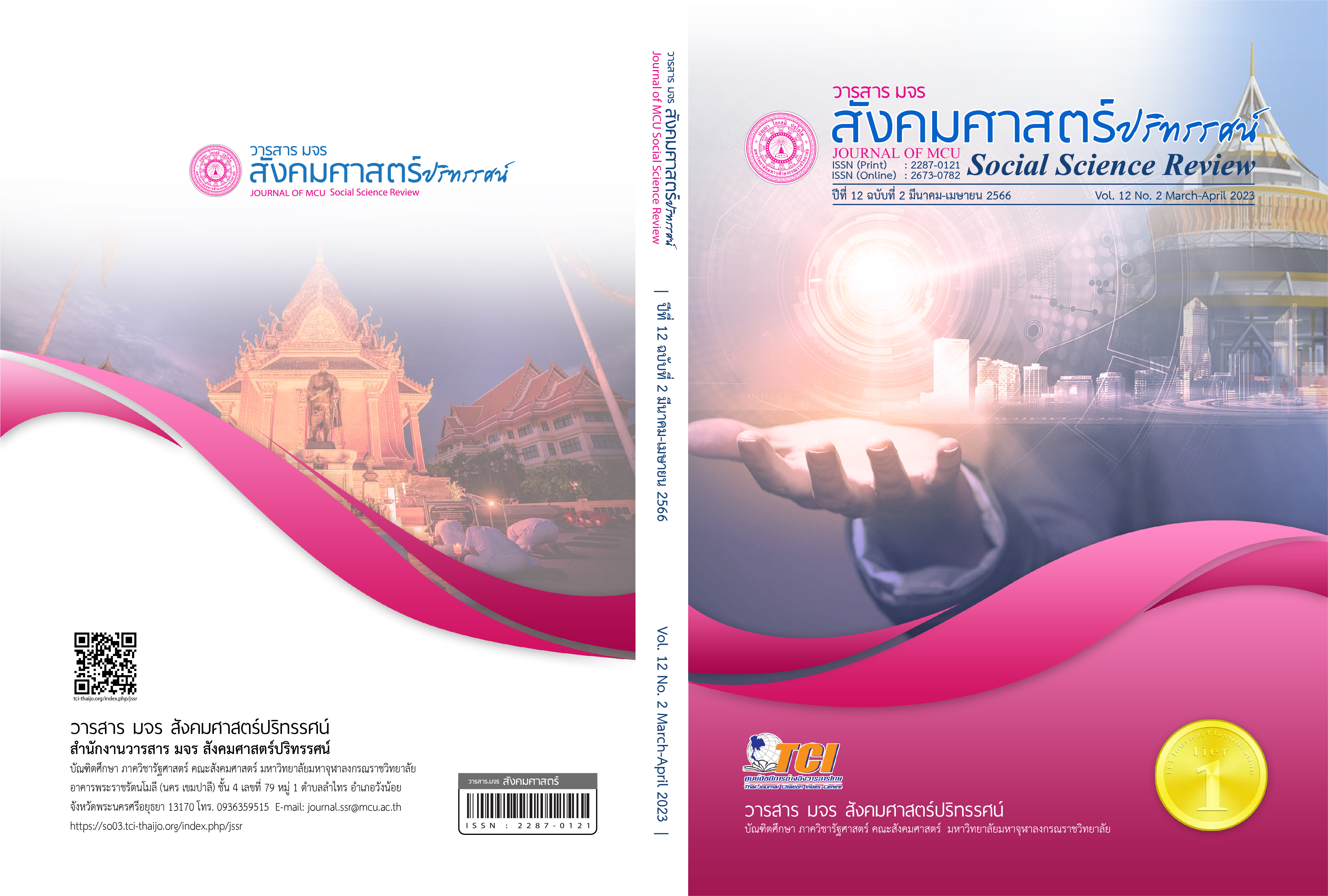การวิเคราะห์องค์ประกอบองค์การแห่งนวัตกรรมของ การไฟฟ้าฝ่ายผลิตแห่งประเทศไทย
คำสำคัญ:
องค์การแห่งนวัตกรรม, วัฒนธรรมองค์การ, ภาวะผู้นำเชิงนวัตกรรมบทคัดย่อ
การวิจัยครั้งนี้ใช้เป็นการวิจัยเชิงปริมาณ แบบเน้นการวิจัยเชิงสำรวจ มีวัตถุประสงค์เพื่อตรวจสอบความสอดคล้องของโครงสร้างเชิงองค์ประกอบขององค์การแห่งนวัตกรรมของการไฟฟ้าฝ่ายผลิตแห่งประเทศไทยกับข้อมูลเชิงประจักษ์ และเพื่อศึกษารูปแบบขององค์การแห่งนวัตกรรมของการไฟฟ้าฝ่ายผลิตแห่งประเทศไทย กลุ่มตัวอย่างที่เป็นผู้บริหารทุกระดับของการไฟฟ้าฝ่ายผลิตแห่งประเทศไทย จำนวน 316 คน โดยกลุ่มเป้าหมายดังกล่าว ใช้วิธีสุ่มตัวอย่างแบบง่าย เครื่องมือเป็นแบบสอบถามแบบมาตราส่วนประมาณค่า 5 ระดับ สอบถามเกี่ยวกับองค์ประกอบองค์การแห่งนวัตกรรมของการไฟฟ้าฝ่ายผลิตแห่งประเทศไทย โดยค่าความเชื่อมั่น เท่ากับ 0.91 เก็บข้อมูลโดยแบบสอบถามผ่านระบบออนไลน์ สถิติที่ใช้ในการวิเคราะห์ ค่าความถี่ ค่าร้อยละ ค่าเฉลี่ย ส่วนเบี่ยงเบนมาตรฐาน และการวิเคราะห์องค์ประกอบเชิงยืนยัน
ผลการวิจัยนี้ประกอบด้วย 2 ส่วน ได้แก่ ผลการวิเคราะห์องค์ประกอบเชิงยืนยันซึ่งพบว่า ค่าวัดระดับความกลมกลืน คือ Chi-square ( ) = 599.06, df = 679, p-value = 0.00, /df (CMIN/DF) = 0.879, RMR = 0.00, RMSEA = 0.019, GFI = 0.901, AGFI = 0. .837, TLI = 1.00 และ CFI = 1.00 แสดงว่า การวิเคราะห์องค์ประกอบขององค์การแห่งนวัตกรรมของการไฟฟ้าฝ่ายผลิตแห่งประเทศไทยเชิงยืนยันมีความสอดคล้องกับข้อมูลเชิงประจักษ์ และรูปแบบขององค์การแห่งนวัตกรรมของการไฟฟ้าฝ่ายผลิตแห่งประเทศไทย ประกอบด้วย 4 ด้าน ได้แก่ 1) ด้านภาวะผู้นำเชิงนวัตกรรม 2) ด้านการกำหนดโครงสร้าง และการพัฒนาบุคลากร 3) ด้านวัฒนธรรมองค์การที่ส่งเสริมนวัตกรรม และ 4) ด้านการสร้างบรรยากาศองค์การแห่งนวัตกรรม
เอกสารอ้างอิง
การไฟฟ้าฝ่ายผลิตแห่งประเทศไทย. (2564). โครงสร้างองค์กร วิสัยทัศน์ พันธกิจ วัฒนธรรม และค่านิยมองค์การ. สืบค้น 9 กันยายน 2564, จากhttps://www.egat. co.th/ index.php?option= com_ content &view=article&id=2137&Itemid=149
ชวน ภารังกูล. (2552). นวัตกรรมการบริหารโรงเรียนชายแดนภูมิภาคตะวันตก (วิทยานิพนธ์ปรัชญาดุษฎีบัณฑิต สาขาวิชาการบริหารการศึกษา). นครปฐม: มหาวิทยาลัยศิลปากร.
พูลพงศ์ สุขสว่าง. (2557). หลักการวิเคราะห์โมเดลสมการโครงสร้าง. วารสารมหาวิทยาลัยนราธิวาสราชนครินทร์, 6(2), 136-145.
รัตนวดี โมรากุล และคณะ. (2560). การวิเคราะห์องค์ประกอบองค์การแห่งนวัตกรรมของสถานศึกษาขั้นพื้นฐาน. Veridian E-Journal, 10(2), 41-55.
ศศิประภา ชัยประสิทธิ์. (2552). องค์กรแห่งนวัตกรรม ทางเลือกของผู้ประกอบการยุคใหม่. วารสารนักบริหาร, 30(2), 60-63.
สำนักงานนวัตกรรมแห่งชาติ. (2547). การจัดการนวัตกรรมสำหรับนักบริหาร. กรุงเทพฯ: กระทรวงวิทยาศาสตร์และเทคโนโลยี.
สำนักงานนวัตกรรมแห่งชาติ. (2563). การจัดการสู่องค์กรนวัตกรรม. กรุงเทพฯ: กระทรวงวิทยาศาสตร์และเทคโนโลยี.
องค์กร ประจันต์เขตต์. (2557). องค์กรแห่งนวัตกรรมการศึกษาทางเลือกใหม่ของการบริหารการศึกษา. วารสารพยาบาลทหารบก, 15(1), 45-51.
Christiansen, J. A. (2000). Building The Innovative Organization: Management Systems that Encourage Innovation. Hampshire: Macmillan Press.
Drucker, P. F. (2002). The Discipline of Innovation. Harvard Business Review. (August): 95-103.
Harvard Business School. (2003). Managing Creativity and Innovation. Boston: Harvard Business School Press.
Hay Insight selections. (2005). The innovative organization: Lessons learned from most admired companies. New York: McGraw Hill.
Merx-Chermin, Mireille and Nijhof, W. J. (2005). Factor Influencing Knowledge Creation and Innovation in an Organization. Journal of European Industrial, 2(29), 135-147.
Moore, G. A. (2006). Dealing with Darwin. MBA. 8(92), 95-100.
Yamane, T. (1973). Statistics: An Introductory Analysis (3rd EdX. New York: Harper and Row Publications.
Tidd, et al. (2001). Managing Innovation Integrating Technological Market and Organization Change. Chichester: John Willey & Sons.
ดาวน์โหลด
เผยแพร่แล้ว
รูปแบบการอ้างอิง
ฉบับ
ประเภทบทความ
สัญญาอนุญาต
ลิขสิทธิ์ (c) 2023 วารสาร มจร สังคมศาสตร์ปริทรรศน์

อนุญาตภายใต้เงื่อนไข Creative Commons Attribution-NonCommercial-NoDerivatives 4.0 International License.
เพื่อให้เป็นไปตามกฎหมายลิขสิทธิ์ ผู้นิพนธ์ทุกท่านต้องลงลายมือชื่อในแบบฟอร์มใบมอบลิขสิทธิ์บทความให้แก่วารสารฯ พร้อมกับบทความต้นฉบับที่ได้แก้ไขครั้งสุดท้าย นอกจากนี้ ผู้นิพนธ์ทุกท่านต้องยืนยันว่าบทความต้นฉบับที่ส่งมาตีพิมพ์นั้น ได้ส่งมาตีพิมพ์เฉพาะในวารสาร มจร สังคมศาสตร์ปริทรรศน์ เพียงแห่งเดียวเท่านั้น หากมีการใช้ภาพหรือตารางหรือเนื้อหาอื่นๆ ของผู้นิพนธ์อื่นที่ปรากฏในสิ่งตีพิมพ์อื่นมาแล้ว ผู้นิพนธ์ต้องขออนุญาตเจ้าของลิขสิทธิ์ก่อน พร้อมทั้งแสดงหนังสือที่ได้รับการยินยอมต่อบรรณาธิการ ก่อนที่บทความจะได้รับการตีพิมพ์ หากไม่เป็นไปตามข้อกำหนดเบื้องต้น ทางวารสารจะถอดบทความของท่านออกโดยไม่มีข้อยกเว้นใดๆ ทั้งสิ้น





